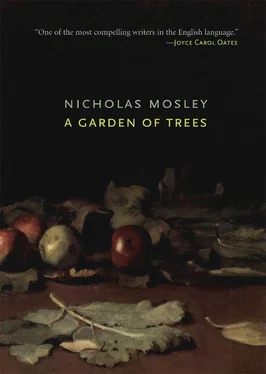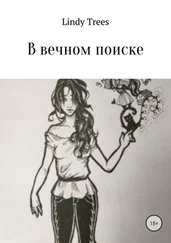A cold room with white walls, the smell of paraffin, footsteps above the ceiling, a dragging sound as if bodies were being moved, what was everybody doing? One, crossing a yard, carrying a pail, went in through a door and came out again, having fed something. From my window I watched him cautiously. I did not want to be seen. Another, on the telephone, spoke to the empty hall. On the landing the sound of brushes bumped against the banisters, the whirring refrain of a cleaner came and went in drones, an aeroplane flew above the trees lending insistence to the moment, prolonging it, so that the noise should have to cease before I moved. Time tapped past like a blind man’s stick on the pavement. If I came in, I thought, I should be caught, I should be standing by a window with nothing to do. In the yard a plate was emptied into a dustbin, having fed something. A fly was lying on its back, having died of the cold. The blind man tapped along and did not get anywhere because there was nothing to see. I wondered if I should be feeding or if I should die of the cold.
On the landing there was silence. I emerged like a burglar. Creeping past some china it seemed improbable not to fall. I could rearrange the pots and hide the pieces. The banisters, if they splintered, could be stuck with glue. Myself, hearing voices, hid in an alcove. I was carefully examining some sporting prints. A horse was wedged across a hedge like a cushion. A man in a top-hat was shooting snipe. I was observed from a doorway. Good-morning. Good-morning. Breakfast was wheeled away dismembered on a stretcher.
What do people do when they are on their own? Their breathing is in communication, their atmosphere is that which they can pretend with other people; and when they are alone, then, do they breathe at all? For the atmospheres are different, this I had known, the difference between air and water, animals and fish; and if I could breathe on my own and not with other people, then why should they, who found it so easy with others, be able to breathe in solitude? Perhaps they did not. Perhaps they, like the chairs and tables of philosophers, ceased to exist when others were not conscious of them. And if their existence was spasmodic, they need not know.
When you observe someone who is alone, who does not know he is being observed, it is embarrassing. Why? Looking in through a window, sometimes, by chance, from a garden, you see something you are not expected to see. A man, pacing a room, his eyebrows raised, his hands behind his back, his head tilted — you have looked in on something that is embarrassing because it is not proper. The man, for the moment, is not a man. He is not real. He is the character on the stage, his faces are the actor’s grimaces, if you were not the audience the actor would not be there. And yet he is not aware of you, he is playing the wrong part, it is as if it were you who had put him on the mad and empty stage.
A woman enters the darkened corridor in which you are standing. She does not see you. She stops awkwardly, pouting, she murmurs something. If you do not make your presence known you are being rude. Why? As you cough she will start, arrange herself, she will alter, she will be petulant in the same way as if she had been awakened from sleep. This awakening is a fact, it is the gasp of the swimmer as he dives upon the water, the moment when the breath does stop, physically, and then the breathing is different. But before, when the woman was alone, did she find the air sufficient?
She? But why not I? Is it not this that I should be saying?
I, who do not exist in water, can I say that I exist in air? It is not air that I breathe. It was I who was caught in the corridor, a phantom living with phantoms, smelling the smoke of memories and the decadence of dreams.
Have you missed breakfast? It doesn’t matter. Let’s get you. . Really, it doesn’t matter. At least some. . Thank you, so much, no.
Smoke that comes in coils around the throat of solitude. It may bring tears to the eyes, illusion to the senses, but it is not breathing. In the silent house there is no existence except the phantom of Annabelle.
They are embarrassed. I know that they are embarrassed. They think that they are seeing me on my own.
It is embarrassing through the window, it is embarrassing in the corridor, it is embarrassing in the crowd when one man stands against a pillar when he will not move when he will not talk when he will not smile when introductions are no good because he would hate them. Why is it embarrassing? Would it not be more embarrassing if you were to take a person performing the functions that are expected and separate him from the crowd and watch him there, apart from his context, performing the functions that are expected? Take a man making an after-dinner speech, for instance, and put him in the desert; with his fantastic clothes his important gestures his silly words would he not be embarrassing? Producing his stories for the Sphinx would he not be peculiar? Take a hostess from her party and put her in the sea, would she not be. . she is, in fact, often, at a marriage, for instance, in a fashionable church;—she is most disquieting. They would not be seen dead, of course: really, this is true, they would not be seen dead with their waistcoats and tiaras in the desert. But the man who lives with the sea and with the Sphinx, who sees things in these terms only, he is seen dead, yes, he is seen dead at dinner. And so he is embarrassing.
But supposing everyone at all times behaved like this, behaved as if they were in terms of the Sphinx and of the sea as if that was what they were and that was their reality, would that be embarrassing? Everyone at all times the same whether they were in the crowd or seen unexpectedly through a window or come upon in the corridor, everyone to his solitary image permanent — then there would be no speeches, no introductions, they would not be needed — you would know, you would know everything, you would have no need of others to explain that you exist. You need not die.
Everything is in terms of God, perhaps.
Someone whom you love when you see them through a window — it is not embarrassing. Not more dreadful than if you should hold their hand. Myself, I am not more embarrassing than when I am in company. I talk to myself, of course; but then I do that when I am with others. And I do not hear what I say.
Marius’s serious face against the window.
They, the three of them, always acted the same as if they were alone or faced with enormities. Coming up on them in the passage they would not start, they were always amazed, so what was there to start for? And in the garden if you looked in on them it would not be improper because they would be looking out. What did Marius see?
He saw, I think, things in relation to the desert. Not even the noises, just the gestures of groups that are grotesque when put into this relationship. He was older than I, and perhaps more compassionate.
I left the house one evening and went into the town. A market town, on Saturday night, with people in the streets. I saw the groups then. The men stood quietly at every corner, the old at the back, the middleaged in the centre, and the youths in the front. They were arranged, resolutely, as if for a photograph. They stood there for hours, with their hands in their pockets, waiting. At times it looked as if they were about to be shot.
A line of girls came up the street arm in arm through the darkness. When they passed a lamp it was surprising to see how many of them were old. They were giggling and lurching as if they were drunk. They wore short skirts and had scarves around their heads. When they passed a group of men they doubled up and screamed like peacocks.
I remember Peter telling this story. A girl asked him, “If your peacock flew into somebody else’s garden and laid an egg, whose egg would it be?” “Mine,” he said. “Ha ha, you silly, peacocks don’t lay eggs.” “But you said this one did,” he said. “But they can’t,” she said. “Then why did you say it did?” he said. “That is the point of the joke,” she said. “What joke?” he said.
Читать дальше












